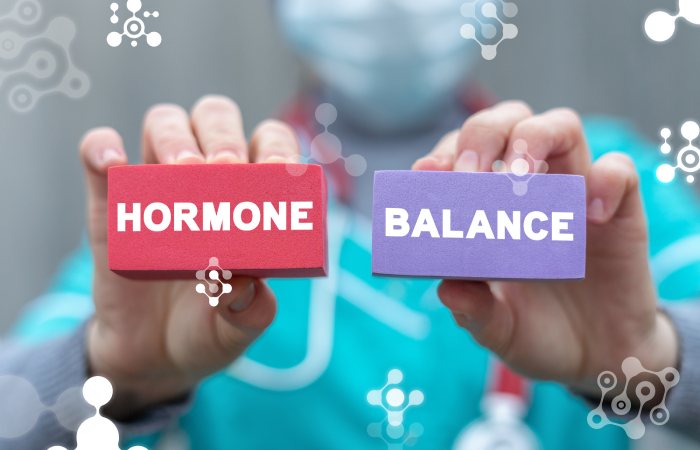Human bodies are pretty amazing, aren’t they? There’s so much complex stuff happening behind the scenes to keep you thriving. One of the most crucial parts of this intricate system are your hormones. These chemical messengers act like controllers, constantly regulating things like growth, mood, reproduction, metabolism, and more. While you can’t see them, your hormones play a tremendous role in keeping you healthy and functioning at your best every single day.
It’s estimated that there are over 50 different hormones that help your body work synergistically, and understanding these powerful chemicals and how to keep them balanced is key to maintaining well-being.
The good news is that you have more control over your hormones than you may realize! Being aware of symptoms of imbalance and making key lifestyle tweaks can go a long way in helping hormones function optimally. So, keep reading to learn more about how hormones impact your health and well-being.
Table of Contents
Hormones: What’s their role?
When it comes to hormones, it’s all about chemical communication. They travel through your bloodstream to organs and tissues, delivering signals and acting as messengers to regulate processes like growth, reproduction, metabolism and more.
Some key hormones include:
- Estrogen and progesterone, which regulate the female reproductive system.
- Testosterone, which regulates male reproductive tissues and promotes muscle growth.
- Thyroid hormones, which control your metabolism.
- Insulin, which regulates blood sugar levels.
- Cortisol, the “stress hormone” that impacts processes like immune function and blood pressure.
Each gland may have its own role to play, but the hormones work together like instruments in an orchestra. It’s a beautifully synchronized system, and when one hormone falls out of tune, it can impact the whole body. In such cases, hormone therapy is sometimes needed to get hormones back into their optimal ranges. After all, keeping your hormones balanced is central to maintaining health and vitality.
What are the symptoms of hormonal imbalance?

Here are some common signs that your hormones may be out of balance:
- Low energy and fatigue
- Problems sleeping
- Weight gain or difficulty losing weight
- Depression, anxiety or moodiness
- Reduced sex drive
- Muscle loss and bone loss
- Hot flashes and night sweats
- Skin changes like acne or dryness
- Digestive issues like constipation
If you regularly experience these symptoms, have your hormone levels tested. Your doctor can determine if you have a hormonal imbalance and recommend treatment options.
What lifestyle factors can influence your hormones?
Did you know that the way you live has a big impact on your hormone health? Below are some factors that can significantly impact your hormones:
- Sleep
Getting the required 7-9 hours of quality sleep per night allows your body to properly release and regulate key hormones overnight. So, when you don’t get enough sleep, it impairs the normal cyclical secretion of hormones like cortisol and ghrelin.
One study found that restricting sleep to only four hours per night decreased leptin levels by 18% and increased ghrelin by 28%, significantly impacting appetite regulation. That said, prioritizing high-quality sleep is crucial to normalizing hormone levels.
- Stress
Ongoing emotional stress causes cortisol levels to remain persistently elevated, which can negatively impact blood sugar regulation, immunity, blood pressure, and more. It’s estimated that 77% of people regularly experience physical symptoms caused by stress.
To combat this, consider incorporating relaxation techniques and making time for unwinding. You can try yoga, meditation, massage, and other relaxing activities. By doing so, you can effectively mitigate stress, lower cortisol levels, and restore proper hormone function.
- Nutrition
What you eat matters for optimal hormone levels. Eating a balanced diet focused on whole and unprocessed foods provides essential vitamins, minerals, antioxidants, and nutrients your endocrine glands need to properly synthesize and secrete hormones. Meanwhile, refined sugars and carbs cause blood sugar spikes and hormonal swings.
- Exercise
Getting regular physical activity, whether cardio, strength training or flexibility workouts, can help regulate hormone levels. High-intensity exercise temporarily increases testosterone, growth hormone and other anabolic hormones for muscle growth and fat loss. Even light exercise, like taking a brisk 30-minute walk, can help lower cortisol and stabilize mood-boosting hormones like serotonin.
- Body weight
Carrying excess body fat interferes with hormone regulation and can lead to imbalances. Thus, it’s paramount to maintain a healthy weight through calorie-controlled eating and regular exercise to optimize hormone function.
In some cases, a hormonal imbalance may require medication. However, there are lots of natural ways to help your hormones function optimally, and one of them is making small, sustainable lifestyle changes. By optimizing your sleep, nutrition, activity levels and stress outlets, you can help your hormones find their rhythm again.
Takeaway
Your hormones may seem like tiny molecules, but they have an incredible influence over how you look, think and feel every single day. By making lifestyle choices that keep your hormones balanced, you can help your whole body function optimally.
So, pay attention to any symptoms of hormonal imbalance, and don’t hesitate to talk to your doctor if you think your hormones need a little extra support. With some awareness and proactive healthy habits, you can take control of your hormonal health and keep your body and mind performing at their best.


